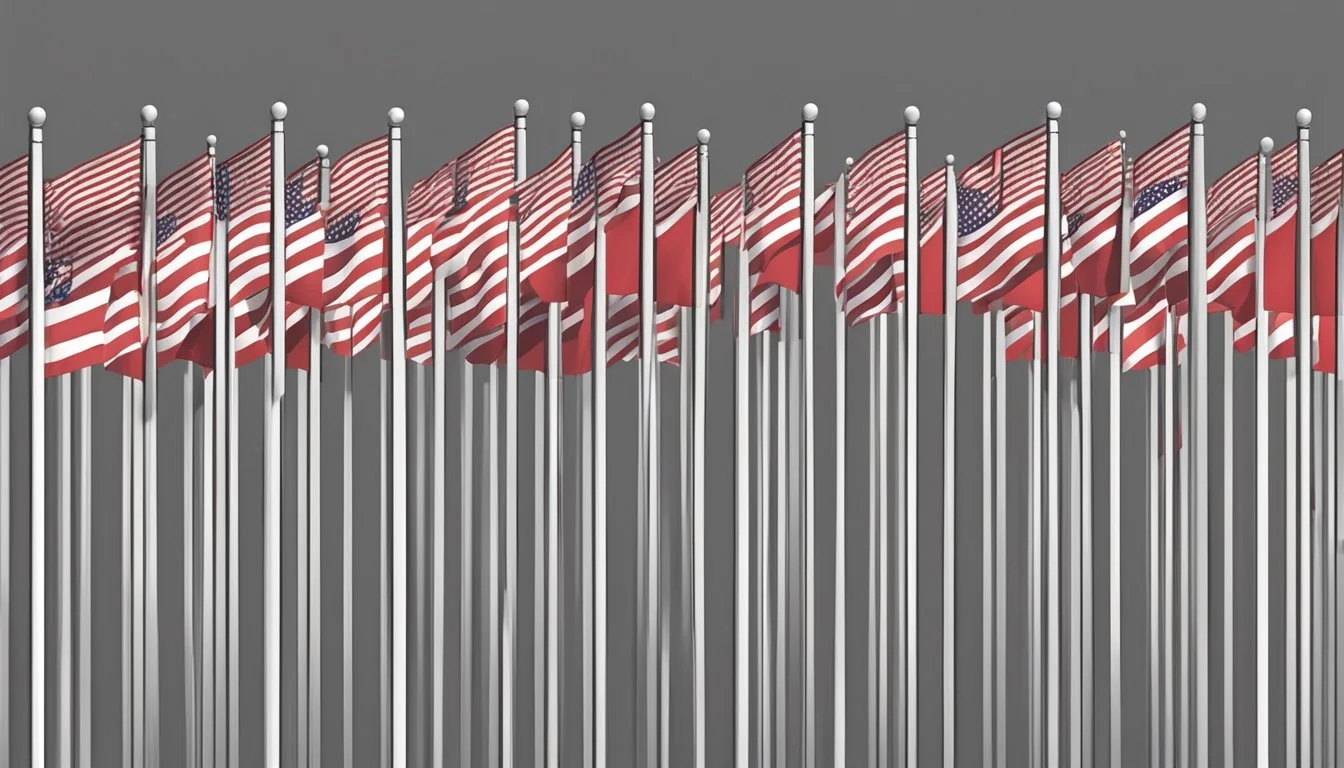11 Red Flags That Your Friendship Is Built on Competition and One-Upmanship
Identifying Toxic Dynamics in Relationships
Friendships should thrive on mutual respect, trust, and positive support. When a friendship starts to feel more like a competition, it's crucial to recognize the signs. No one wants to be in a relationship where they're constantly being outdone or belittled.
Recognizing red flags in any relationship can save time and emotional energy. This article explores the signs that your friendship might be based on competition and one-upmanship. Understanding these signs ensures you surround yourself with genuine and supportive friends.
1) Constantly One-Upping Achievements
A friend who constantly tries to overshadow your achievements can be exhausting. When you share good news, they immediately follow up with something they have done, often making it sound superior. This behavior can diminish your joy and leave you feeling unappreciated.
It's common for competitive friends to dismiss your success by comparing it to their own accomplishments. For instance, if you received a promotion, they might quickly point out their own recent success at work, making it seem more significant.
This pattern of one-upmanship can create a sense of rivalry rather than camaraderie. It can feel like an unspoken contest, where recognition and validation become scarce commodities. This can erode the mutual respect that is fundamental to healthy friendships.
While friendly competition can be motivating, constant overshadowing is harmful. It breeds resentment and can lead to feelings of inadequacy. A genuine friend should celebrate your achievements openly and without comparison.
In situations where this behavior is persistent, it might be necessary to address it directly. Open communication can sometimes mitigate the issue, but if it persists, it may indicate deeper issues in the friendship. Recognizing this red flag is crucial for maintaining emotional well-being.
2) Dismissing Your Successes
When a friend dismisses your successes, it can be a clear sign of underlying competition. Instead of celebrating your achievements, they downplay them or change the topic. This type of response can make you feel undervalued and question your own accomplishments.
Consistently dealing with dismissive reactions can be emotionally draining. It may even deter you from sharing future successes. A healthy friendship involves mutual acknowledgment and being happy for each other's accomplishments.
Dismissive behavior can manifest in subtle remarks or jokes that belittle your achievements. Pay attention to these signs, as they can reveal deeper issues within the friendship. It's important to recognize this pattern early to address it effectively.
A friend who truly supports you will cheer for your victories, regardless of their own situation. If your friend frequently dismisses your success, it may be time to reassess the dynamics of the relationship. Addressing these issues directly can help determine the future of your friendship.
To learn more about recognizing a toxic friendship, you might find the article on 11 Clear Signs of a Toxic Friendship insightful. Understanding these signs can empower you to make informed decisions about your relationships.
3) Reluctant to Celebrate Milestones
When friends hesitate to celebrate your milestones, it can indicate underlying competition. Achievements like promotions, birthday milestones, or personal successes deserve recognition and support.
A friend who downplays or ignores these events may feel threatened by your progress. This reluctance often stems from jealousy or insecurity about their own accomplishments.
A healthy friendship involves mutual encouragement and joy in each other's successes. Celebrating milestones together strengthens emotional bonds and fosters trust.
Lack of enthusiasm for your achievements can make you feel undervalued. This behavior reveals a one-sided relationship where only one person's milestones seem important.
Friends who are truly supportive will share your joy and offer genuine congratulations. If you notice hesitation, it's worth considering the dynamics of the friendship.
The absence of celebration is more than just an oversight; it reflects deeper issues within the relationship. This sign is crucial in identifying a competitive or unbalanced friendship dynamic.
Mutual respect and happiness for each other's successes form the foundation of a strong friendship. If this aspect is missing, it may indicate a competitive undercurrent.
Evaluate if this reluctance is a pattern, as it could signify larger issues within the friendship. This observation helps in understanding the true nature of your connection.
4) Always Changing the Subject to Themselves
A common sign of competitive and one-upmanship behavior in friendships is when one person constantly redirects conversations back to themselves. Rather than engaging in a balanced give-and-take, they monopolize discussions to emphasize their own experiences.
They might respond to your stories by immediately sharing similar experiences of their own. For example, if you mention a recent trip, they might quickly jump in with tales of their travels.
This behavior can suggest they are more focused on showcasing their own achievements rather than genuinely listening to and supporting you. Consistently steering the conversation can indicate a lack of empathy and consideration for others.
It's particularly noticeable when you share something significant and they fail to give it the attention it deserves. For instance, discussing personal struggles might quickly lead them to shift focus to their own issues.
Improving communication is crucial, but if the pattern persists, it might be necessary to reevaluate the friendship. Checking for this red flag can help in identifying relationships that may not be as supportive and mutual as they should be.
5) Bragging About Every Small Win
Bragging about every small win can be a significant red flag in friendships. When one person constantly highlights even the tiniest achievements, it suggests a need for validation and superiority.
This behavior can make the other person feel undervalued or insignificant. It impedes the genuine celebration of each other's successes, turning interactions into competitive comparisons.
Such friends might overshadow your own milestones with their minor accomplishments. This can create an unhealthy dynamic, where the focus shifts from mutual support to self-aggrandizement.
Should this pattern persist, it could indicate deeper issues rooted in insecurity or a lack of empathy. It’s essential to address these concerns to maintain a balanced and supportive friendship dynamic. For more insights, check out red flags of potentially toxic friendships.
Ignoring this behavior can lead to long-term resentment and a breakdown of trust. If a friend constantly brags without reciprocating genuine interest in your life, it might be time to reassess the friendship.
A healthy friendship involves mutual respect and genuine happiness for each other’s achievements. Constant bragging disrupts this balance, potentially creating an environment of jealousy and competition. Recognizing and addressing this red flag early on can help foster more fulfilling and supportive relationships.
6) Downplaying Your Efforts
A key sign of a competitive friendship is when a friend minimizes your achievements. Instead of celebrating your successes, they might respond with backhanded compliments.
Statements like "Anyone can do that" or "It's no big deal" can be common.
This behavior can make you feel undervalued. It erodes the support and validation that friendships should provide. Genuine friends should acknowledge and celebrate each other's accomplishments wholeheartedly.
Consistent downplaying of efforts can lead to feelings of frustration and self-doubt. When this happens frequently, it becomes evident that your friend is more interested in maintaining a sense of superiority rather than fostering a balanced relationship.
It's essential to recognize this pattern and address it. You deserve friends who uplift and genuinely support your endeavors.
7) Competing For Attention
In some friendships, one person may constantly seek to be the center of attention. They might interrupt conversations to talk about their own experiences or achievements. This behavior can make others feel overshadowed and undervalued.
A friend who often dismisses your opinions or stories can indicate an unhealthy dynamic. They may seem uninterested unless they are the focus.
These actions can leave you feeling drained and frustrated. It's essential to recognize this pattern early to address it.
A typical trait is when they seek validation from others by being overly dramatic or exaggerated in social settings. This not only stifles your self-expression but also erodes the genuine connection in the friendship.
Their need for attention might stem from insecurities. Understanding this can help you navigate the situation compassionately.
However, a consistent pattern of seeking attention at your expense is problematic. Addressing it directly can help balance the friendship better.
Learning to set boundaries is crucial. If the friend disregards these boundaries, it may be time to reevaluate the relationship.
Cross-referencing with expert advice, such as from wikiHow, suggests identifying these red flags early can prevent potential emotional strain.
8) Minimizing Your Accomplishments
A friend who consistently minimizes your accomplishments may be driven by jealousy or insecurity. When you share your successes, they may downplay them or make dismissive comments. This behavior can make you feel undervalued and unappreciated.
For example, you might achieve a significant milestone at work, but instead of congratulating you, they respond with, “It’s not that big of a deal." This kind of reaction can diminish your excitement and pride in your achievements.
Another sign is when they shift the conversation back to themselves after you share good news. Instead of acknowledging your success, they might immediately start talking about their own experiences or achievements.
This behavior indicates a lack of genuine support. True friends celebrate each other’s successes without comparison. If someone continually minimizes your accomplishments, it’s a red flag that the friendship may be unhealthy.
Minimizing your accomplishments can also be subtle. For instance, they might give backhanded compliments that undermine your achievements. Pay attention to how often they fail to show enthusiasm for your successes. These patterns reveal more about their true feelings towards your progress.
If this behavior persists, it can create a toxic dynamic. It’s important to recognize this red flag and address the issue directly or reconsider the value of maintaining such a friendship. Recognizing these signs helps to ensure that your friendships are built on mutual respect and genuine support.
9) Rarely Offering Genuine Praise
A significant red flag in competitive friendships is the lack of genuine praise. When a friend seldom acknowledges your achievements, it may signal underlying jealousy. Healthy friendships involve celebrating each other's successes.
Friends who rarely offer praise might have difficulty seeing beyond their own aspirations. This can create a competitive dynamic, where they view your achievements as threats rather than moments for celebration.
Another aspect is the type of feedback they provide. Instead of genuine compliments, they might give backhanded remarks or faint praise. This behavior can lead to feelings of inadequacy and strain the friendship.
If someone continuously downplays your successes, it can affect self-esteem. A supportive friend would recognize and celebrate milestones. Rarely offering praise suggests a fundamental imbalance in the relationship. For more insights on friendship red flags, check this article.
10) Always Trying to Outdo You
A hallmark of a competitive friend is the constant need to outshine others. This behavior is evident when a friend consistently tries to surpass your achievements.
For instance, if you share a personal win, they might immediately counter with something they accomplished, trivializing your success. Such behavior suggests an unhealthy competitive streak.
Instead of providing support, they focus on their accomplishments. This can create feelings of inadequacy or frustration. The friendship feels more like a contest than a supportive relationship.
Sometimes, these friends might even go as far as replicating your goals to outdo you. They might enroll in the same classes or take up hobbies just to showcase superiority.
This relentless competition can drain energy. Genuine friendships thrive on mutual support and encouragement. A friend who constantly competes undermines this fundamental principle.
It's crucial to recognize this pattern. A true friend celebrates your achievements rather than competing against them. Just as mentioned in this article, constant competition can be a sign of an unhealthy friendship dynamic.
11) Gloating About Their Own Successes
When a friend consistently gloats about their successes, it may indicate an unhealthy level of self-importance and competition.
They can overshadow moments meant for shared happiness. For instance, if you announce a personal achievement and they immediately counter with something they’ve done better, their behavior can diminish your accomplishment.
Friends should celebrate each other's achievements genuinely. When boasting becomes a habitual practice, it can breed resentment.
The problem arises when their gloating feels constant and one-sided. Their intent seems less about sharing joy and more about proving superiority.
Sometimes these friends mask their bragging with false humility. This can make it difficult to address the issue directly.
It’s crucial to recognize that a pattern of gloating can undermine the balance in your friendship. It shifts focus from mutual support to unspoken competition.
Evaluating whether these moments are isolated or frequent can help you understand their impact on your relationship's overall dynamic.
Understanding Competitive Friendships
Competitive friendships arise when individuals feel the need to constantly measure themselves against their friends, either to feel superior or to keep up. This section explores the psychological roots of competition in friendships and outlines the differences between healthy and unhealthy competition.
The Psychology Behind Competition
Competition in friendships often stems from deep-seated insecurities. Individuals may struggle with a strong desire to prove their worth, which can lead them to use their friends as benchmarks for personal success. The competitive urge can be linked to childhood experiences, where comparison with siblings or classmates was frequent.
This behavior can be exacerbated by societal pressure to succeed and the pervasive influence of social media, which often fuels the comparison trap. Understanding these factors helps to identify why some friendships become arenas for one-upmanship rather than mutual support.
Healthy vs Unhealthy Competition
Healthy competition can motivate friends to achieve their best. It encourages mutual growth, where both individuals feel inspired by each other's successes. In these scenarios, friends push each other to improve, celebrate achievements, and maintain respect and admiration.
Unhealthy competition, on the other hand, breeds resentment and tension. It manifests in constant comparisons, jealousy, and a lack of genuine support. Instead of feeling happy for a friend's success, an individual may feel threatened or diminished. This kind of competition undermines the foundation of trust and respect essential for a strong friendship.
Being able to discern between these two types of competition is crucial. Healthy competition enhances the bond while unhealthy competition can corrode it, leading to a toxic friendship dynamic.
Impact of Competitive Friendships
Competitive friendships can lead to significant emotional strain and hinder personal development. These relationships often bring about tension and self-doubt, affecting various aspects of one's life.
Emotional Consequences
Competitive friendships frequently result in stress and anxiety. Constantly feeling the need to outshine a friend can be emotionally exhausting. Individuals might experience diminished self-esteem, especially if they feel inadequate compared to their friend's achievements.
Such dynamics can also lead to resentment and bitterness. Over time, the perpetual need to compete can dissolve the foundation of trust. This creates a toxic environment where genuine emotional support is scarce. The feelings of jealousy and rivalry may overshadow the positive aspects of the friendship, leading to further emotional harm.
Effects on Personal Growth
Continually engaging in one-upmanship hinders personal development. Instead of focusing on self-improvement, time and energy are wasted on competing. This leaves little room for exploring one’s own goals and aspirations. Consequently, personal achievements may stagnate.
Additionally, these friendships often discourage risk-taking and new experiences. Fear of failure and being outperformed creates an environment of complacency. This lack of encouragement for growth impacts one’s ability to pursue new opportunities, affecting long-term personal and professional success.
Strategies for Addressing Competitive Behavior
Effective communication and defined boundaries are essential in managing competitive behavior within friendships.
Communicating Openly
Open dialogue is crucial. Addressing issues directly can prevent misunderstandings. Start conversations with "I feel" statements to avoid sounding accusatory. For instance, "I feel upset when our conversations turn competitive" helps convey feelings without blaming.
Acknowledge your friend's positive traits. This can make them more receptive. For example, "I admire your skills, but I feel overshadowed at times" maintains respect while addressing the issue.
Regular check-ins about the friendship's dynamics can also help. Ask questions like, "How do you feel our friendship is going?" This invites honest feedback and shows a willingness to improve the relationship together.
Setting Boundaries
Boundaries maintain balance. Clearly define what topics or behaviors trigger competitive feelings. If boasting about achievements causes discomfort, agree to limit such discussions.
Be consistent and firm when boundaries are crossed. Politely remind your friend, "We agreed to avoid comparing our successes," to reinforce agreements.
Discuss the importance of mutual respect and trust. Explain that boundaries benefit both parties. For instance, "These limits help us respect each other's individuality," emphasizes the positive impact on the friendship.
Incorporate regular reminders of boundaries, particularly when new sensitive topics arise, to keep the friendship healthy.












